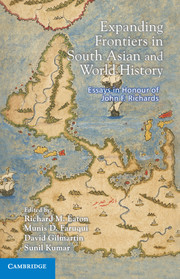Book contents
- Frontmatter
- Contents
- List of Contributors
- Foreword
- Introduction
- 1 At Empire's End: The Nizam, Hyderabad and Eighteenth-century India
- 2 The Ignored Elites: Turks, Mongols and a Persian Secretarial Class in the Early Delhi Sultanate
- 3 ‘Silk Road, Cotton Road or … Indo-Chinese Trade in Pre-European Times’
- 4 The Political Economy of Opium Smuggling in Early Nineteenth Century India: Leakage or Resistance?
- 5 Opium and the Company: Maritime Trade and Imperial Finances on Java, 1684–1796
- 6 The Mughals, the Sufi Shaikhs and the Formation of the Akbari Dispensation
- 7 Notes on Political Thought in Medieval and Early Modern South India
- 8 Becoming Turk the Rajput Way: Conversion and Identity in an Indian Warrior Narrative
- 9 Nature and Nurture on Imperial China's Frontiers
- 10 The Frontiers of Memory: What the Marathas Remembered of Vijayanagara
- 11 ‘Kiss My Foot,’ Said the King: Firearms, Diplomacy and the Battle for Raichur, 1520
- 12 Frontiers of Family Life: Early Modern Atlantic and Indian Ocean Worlds
- 13 Chinese Revenue Farms and Borders in Southeast Asia
- Publications
- Index
6 - The Mughals, the Sufi Shaikhs and the Formation of the Akbari Dispensation
Published online by Cambridge University Press: 05 January 2014
- Frontmatter
- Contents
- List of Contributors
- Foreword
- Introduction
- 1 At Empire's End: The Nizam, Hyderabad and Eighteenth-century India
- 2 The Ignored Elites: Turks, Mongols and a Persian Secretarial Class in the Early Delhi Sultanate
- 3 ‘Silk Road, Cotton Road or … Indo-Chinese Trade in Pre-European Times’
- 4 The Political Economy of Opium Smuggling in Early Nineteenth Century India: Leakage or Resistance?
- 5 Opium and the Company: Maritime Trade and Imperial Finances on Java, 1684–1796
- 6 The Mughals, the Sufi Shaikhs and the Formation of the Akbari Dispensation
- 7 Notes on Political Thought in Medieval and Early Modern South India
- 8 Becoming Turk the Rajput Way: Conversion and Identity in an Indian Warrior Narrative
- 9 Nature and Nurture on Imperial China's Frontiers
- 10 The Frontiers of Memory: What the Marathas Remembered of Vijayanagara
- 11 ‘Kiss My Foot,’ Said the King: Firearms, Diplomacy and the Battle for Raichur, 1520
- 12 Frontiers of Family Life: Early Modern Atlantic and Indian Ocean Worlds
- 13 Chinese Revenue Farms and Borders in Southeast Asia
- Publications
- Index
Summary
INTRODUCTION
The authority exercised by the Mughal dynasty over much of northern India in the sixteenth, seventeenth and eighteenth centuries depended in part on various forms of legitimacy that were provided to it from outside the narrow sphere of elite politics. To be sure, the Mughals were also able to rule for so long and with such success because they successfully managed a composite political elite made up of elements both from northern India and from the Deccan (as well as other ‘peripheral’ regions), and migrants from Central and West Asia. However, as with a number of dynasties of the Muslim world in the period, a crucial element in the strategies of rule that they adopted were their relations with religious figures of various sorts. This essay is an attempt to understand the changing relationship between the Mughal rulers and the Sufi shaikhs, focusing on the early days of the formation and consolidation of the Mughal state in India. The question of the Mughal–Sufi equation, as we know, has generally been discussed with reference to the Naqshbandi order. Scholars have devoted particular attention to Shaikh Ahmad Sirhindi (d. 1624), the founder of the Mujaddidi branch of that order, his disciples and his ideology. Their questions have revolved around the extent and the nature of the influence of this group on seventeenth-century Mughal Indian politics. There is no denying of the importance of this debate, and as a matter of fact, the present essay was initially motivated by the desire to contribute to it.
- Type
- Chapter
- Information
- Expanding Frontiers in South Asian and World HistoryEssays in Honour of John F. Richards, pp. 124 - 163Publisher: Cambridge University PressPrint publication year: 2013



